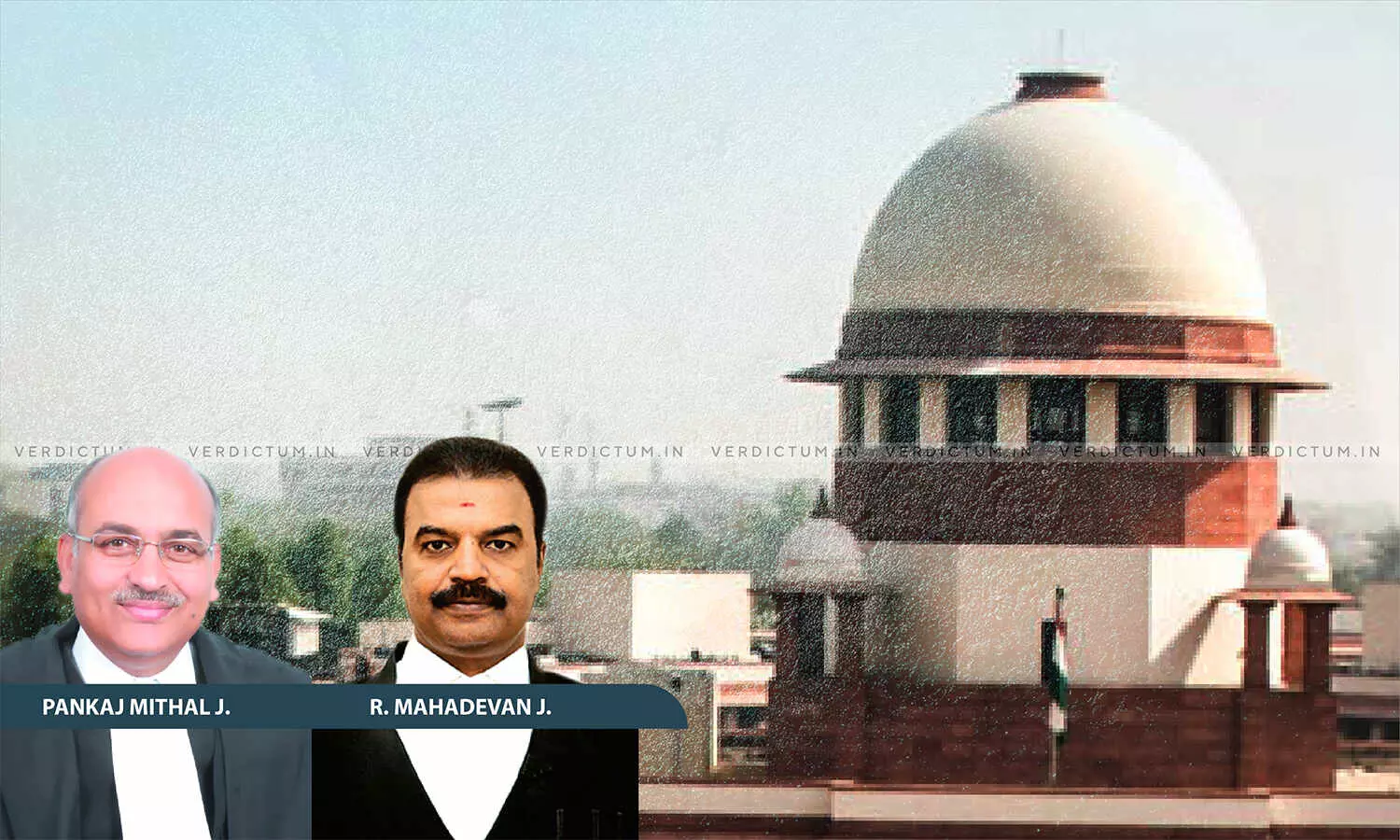
Object Of Punishment Is Also To Reform & Retribute: SC Modifies Sentence Of Convict In 1997 Murder Case
 |
|The Supreme Court while modifying sentence of convict in a murder case, observed that the object of the punishment is also to reform and retribute.
The Court observed thus in a criminal appeal preferred by the accused against the judgment of the Uttarakhand High Court by which it dismissed his appeal and confirmed the judgment of the Trial Court.
The two-Judge Bench of Justice Pankaj Mithal and Justice R. Mahadevan held, "Pertinently, it is to be noted that the object of punishment is not only to deter the accused from committing any further crime, but also to reform and retribute; and the extent of reformation can be derived only by the conduct of the accused exhibited during his days of retribution. Taking note of the above aggravating and mitigating factors, we are of the view that it would meet the ends of justice, if the sentence of imprisonment for life awarded by the Sessions Court as affirmed by the High Court, is modified to the period already undergone by the appellant."
AOR Sudha Gupta appeared on behalf of the appellant/accused while AOR Akshat Kumar appeared on behalf of the respondent/State.
Brief Facts -
The appellant/accused along with two others was tried for having allegedly caused the murder of a man in 1997. The accused allegedly committed the offence under Section 302 read with Section 34 of the Indian Penal Code (IPC) and Sections 25 and 27 of the Arms Act, 1959. The Trial Court found the appellant guilty of the offence and sentenced him to undergo rigorous imprisonment for life with fine of Rs. 1,000/-. However, the Sessions Court acquitted him under the said provisions of the Arms Act. Being aggrieved, the accused approached the High Court but it confirmed the impugned judgment.
As per prosecution case, while the complainant’s father (deceased) and his mother were sitting in their courtyard, four persons including the appellant came there and told to his father that they would teach him a lesion for refusing to give them jaggery and shot at his father. As per the autopsy report, the cause of death was due to shock and haemorrhage as a result of fire arm ante mortem injuries.
The Supreme Court in view of the facts and circumstances of the case, noted, “Though the learned counsel for the appellant pointed out certain deficiencies / inconsistencies / contradictions in the evidence let in by the prosecution, they being minor in nature, cannot be considered as remissness in the investigation enabling the appellant’s acquittal, particularly, when the appellant was present with a gun in the scene of occurrence, when the gun and empty cartridge were recovered based on the information given by the appellant, when the firing was witnessed by P.W.1 and P.W.2, and when the fact that the victim died due to wounds inflicted by gunshot, stood proved by the evidence of P.W.7, Doctor, who performed the autopsy. The law on minor discrepancies which does not affect the basic case of the prosecution, is well settled.”
The Court said that, insofar as the conviction under Section 34 IPC, there is a contradiction in the evidence of the Investigating Officer and the other witnesses on instigation.
“P.W.1 and P.W.2 had deposed in the court that the other accused instigated the appellant to fire the shot, but on the contrary, the Investigating Officer had deposed that during investigation, it was revealed by the complainant and the other witness that the appellant fired on his own”, it added.
The Court further observed that after the acquittal of the other accused with a finding that there was nothing in the FIR or statement under Section 161 to sustain the charge under Section 34 IPC, the appellant remains the sole accused and there could be no charge under Section 34 against him, therefore, his conviction under Section 34 IPC by the Sessions Court as confirmed by the High Court is unsustainable.
“… the concurrent finding recorded by the Sessions Court as affirmed by the High Court that the appellant was found guilty of the offence under section 302 IPC is confirmed. However, the appellant is acquitted of the charge under section 34 IPC and the judgments of the Courts below, insofar as convicting him for the same, are set aside”, it said.
The Court also noted that considering the gravity and nature of the offence and all other relevant factors, the Courts can modify the punishment or reduce/ enhance the period of sentence imposed on the accused.
“We shall thus, consider the sentence imposed on the appellant, in the light of the aforesaid guiding principles. The facts and circumstances highlighted above would clearly disclose that due to sudden provocation, for not giving jaggery, the accused came to the house of the deceased and on exhortation by other accused, the appellant shot the deceased and that, there was no premeditation in the commission of crime”, it observed.
Accordingly, the Apex Court partly allowed the appeal and modified the sentence to the period already undergone by the appellant.
Cause Title- Sandeep v. State of Uttarakhand (Neutral Citation: 2024 INSC 771)
Appearance:
Appellant: AOR Sudha Gupta
Respondent: AOR Akshat Kumar and Advocate Anubha Dhulia.